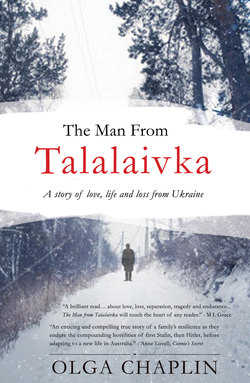Читать книгу The Man From Talalaivka - Olga Chaplin - Страница 15
На сайте Литреса книга снята с продажи.
ОглавлениеChapter 9
Timing was everything. If he had seen a complete map of the Soviet Union, if he had really known the distance he was planning to cover, it must have been only cursorily considered. Just as his parents must have experienced weeks of transportation to their Siberian wasteland prison, so Peter also expected a long journey. ‘Revolutionary’ changes had altered his beautiful Ukrainian culture and life to a point where it was now unrecognisable. But some things always stayed the same. Travel within the regions, and throughout the whole of the Soviet Union was always counted in days, weeks, months. This secret journey would be similar to any that a State official would make for his Party.
Luck would also have to play a part, in order for him to succeed in his plan. His years as veterinary practitioner in his district, and now in the kolkhozes he was forced to supervise, made him relatively valuable to the Communist regime. The regime had brutalised the farmers and peasants, taking all their possessions, and burnt farms to force the villagers into kolkhozes. The hapless farmers took revenge and killed their own livestock rather than lose it to the Stalinist regime.
Peter’s work, in saving what livestock he could, temporarily gave him a higher status in the political upheaval. “It must count for something,” he thought as he considered the possible routes he would need to take, “that already I am trusted on longer journeys without checks, at times.” He had to use this to full advantage in the limited time available. The irony, that he was placed in this situation in his work, whilst his parents suffered at the hands of these same officials, played on his mind. It deepened his resolve to help his parents, to save them if it was possible.
Luck of a different kind, in the form of his despairing close friend, gave Peter the chance to finalise his plan. “Count me in with you, Petro! We will need each other for this journey, my friend!” Mikhaelo pleaded with him, in the secrecy of their meeting. His parents also had been sentenced, but recently, to the same area of Siberia. Each knew the risks involved if their plan was discovered. Trust in each other was paramount, on pain of death.
Their plan was simple, audacious. A senior veterinary practitioner, with an assistant, travelling on official business across the Oblasts, seemed plausible. Only the Oblasts were covered in the documents. Their real destinations were omitted: Omsk and Novosibirsk, the new cities created by the regime and from which the Siberian wastelands and labour camps stretched northwards towards the Arctic Circle. Communist Party propaganda, zealously printed in the Party run newspaper Pravda, espoused the virtues of the gold mines, oil research and industrial expansion of the Siberian region. But others knew the truth. Peter’s, and Mikhailo’s, parents were evidence of this.
In final preparation, they meticulously wrapped salted pork in thick durable cloth, which they then sewed into the front lining of their long, heavy winter coats, still serviceable from their army days. The weight was staggering, yet light compared with the inner burdens they carried. This hidden food was for their parents. It was too dangerous to visibly carry food anywhere now. Not only was food scarce. The regime was following a campaign of starvation in the Ukraine and elsewhere. People were killed in acts of desperation for carrying even small parcels of food, and they knew this. What little money they had was for emergencies, should their forged food vouchers fail.
In the murky dawn light, Evdokia saw her husband to the door of the kolkhoz farmhouse, which they shared with four other families. Peter seemed his usual, sprightly confident self. He resisted holding her that moment longer as he departed, her soft blonde hair merging with hoary mist as she turned to close the door. She had no inkling of what lay ahead for them both—he had spared her this, as the secrecy protected not only her and little Vanya, but also the other families in the farmhouse. The regime was superb at reprisals. It was best that she knew only that he had extended travel for official business. “Dear God, be near to them,” he pleaded as he turned to grasp his horse’s reins.
If there was a moment of truth to be faced at their parting that chilly morning, he pushed it even further from his mind. His new wife and little son needed him. Yet he needed to make this mad, possibly last, gesture to his parents, who may already have perished in Stalin’s labour camp.
